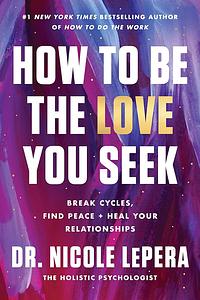Take a photo of a barcode or cover
217 reviews for:
How to Be the Love You Seek: Break Cycles, Find Peace, and Heal Your Relationships
Nicole LePera
217 reviews for:
How to Be the Love You Seek: Break Cycles, Find Peace, and Heal Your Relationships
Nicole LePera
informative
inspiring
reflective
slow-paced
inspiring
reflective
medium-paced
informative
reflective
This book is filled with fascinating info on how connected our neuro and physiological experiences are. It’s so funny to me how our emotional experiences can seem so disconnected from our body or unrelated but our bodies really do drive so much of it and open up another world of emotional regulation and even really connection with others. As someone who currently feels like they don’t know how to exist and feels incapable of emotional self regulation, this book provides a glimmer of hope and belief that things can change and improve
Looking back at this read, I have become less and less enthused about it. “How to Be the Love You Seek” promised to align with a genre of self-help/mental health books that I find particularly interesting - namely those relating to codependency and the development of self fulfillment. LaPera’s book is insightful and uplifting but falls short of distinguishing itself from other books in the genre.
In the first half of the book, LaPera is very empathetic and easy to relate to. I was engaged by her perspective and the interspersed anecdotes she provides about her own life. However, as the book went on, I found it a bit repetitive and the real thesis of the book lacking.
While I enjoyed the read overall, I think my problems with the book arose from the fact that LaPera and I may not see eye to eye when it comes to healing codependent behavior or her liberal usage of the word “trauma.” I can see how her perspective has ignited a following on social media, it plays into the ego very nicely and uplifts the reader. However, coming away from the read I don’t feel that I, in particular, have gained much.
Would I recommend this book? Yes. If you are new to this area of self help, and therapy, then it is a great place to start. It is digestible, and engaging. Do I think it is the right book for someone deep in their trauma therapy journey with a few other books under their belt? No, it might be time to dig a bit deeper and hear from more researched materials.
In the first half of the book, LaPera is very empathetic and easy to relate to. I was engaged by her perspective and the interspersed anecdotes she provides about her own life. However, as the book went on, I found it a bit repetitive and the real thesis of the book lacking.
While I enjoyed the read overall, I think my problems with the book arose from the fact that LaPera and I may not see eye to eye when it comes to healing codependent behavior or her liberal usage of the word “trauma.” I can see how her perspective has ignited a following on social media, it plays into the ego very nicely and uplifts the reader. However, coming away from the read I don’t feel that I, in particular, have gained much.
Would I recommend this book? Yes. If you are new to this area of self help, and therapy, then it is a great place to start. It is digestible, and engaging. Do I think it is the right book for someone deep in their trauma therapy journey with a few other books under their belt? No, it might be time to dig a bit deeper and hear from more researched materials.
slow-paced
This was pretty much the same information as most books on secure attachment, but very drawn out.
hopeful
informative
medium-paced
I'm not a doctor so I can't confirm if this is accurate, but I think it's an interesting read.
A nice introduction to the topic but there’s nothing here that isn’t covered already (and better) in similar books. For a “How To” book written by a psychologist, way too much time is spent on the author’s life story (and other real or fictional people) rather than the reader.
one of the most useful books i’ve read in a long time
ironically read it on my mom’s birthday
ironically read it on my mom’s birthday



